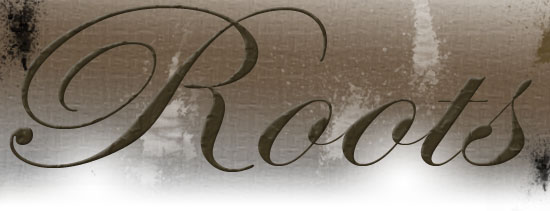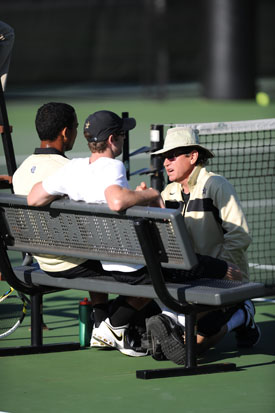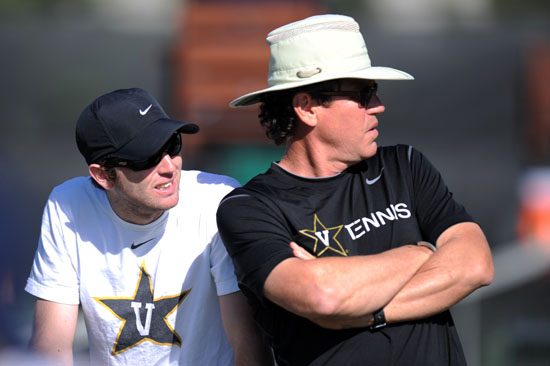May 15, 2012

Roots is a series that profiles Vanderbilt student-athletes and coaches, and reflects back on their lives, forming a roadmap that guides readers through the early years of their lives to where they are today.
Jeremy Organ (Swimming) | Greg Allen (Women’s Golf)
There are points in life when you encounter difficult circumstances that send thoughts rattling back and forth in your head like a game of pong as you try to comprehend the reasoning. But for as trying and disappointing as those times can be, there can also be positive and unexpected opportunities that arise from the misfortunes.
For Vanderbilt Head Men’s Tennis Coach Ian Duvenhage, his love for tennis can be traced back to a life-changing injury his father sustained.
Duvenhage grew up in Kuruman, South Africa, and was the son of a lawyer. His father grew up playing rugby and golf, and also had a passion for woodworking. One day, while working on his electric plank, Ian’s father got a little too close to the blade and lost the tip of his middle finger on his left hand.
From that point on, he was never comfortable swinging a golf club because of the sensitivity. Ian’s days of golfing with his father were done. Around that same time, Ian was introduced to mini tennis in PE class. The game was played on a smaller court with a lower net and a paddle was used instead of a racquet.
To his surprise, the game came naturally to him and he quickly became one of the best in school.
Such instant success in athletics was not typical for Duvenhage. Growing up in South Africa, the three primary sports were cricket, rugby and track. Duvenhage wanted to follow his father’s footsteps so he played rugby, but he quickly learned that it was not his cup of tea.
“About the third time at practice, I tackled somebody and I thought that I died because I could hardly get up,” Duvenhage recalled. “After that I was absolutely petrified of getting hurt so I would pretend to tackle people but I really wasn’t.”
After one year of rugby, Duvenhage stepped away from the sport and ran track. Needless to say, the sport was not for him either.
“I tried track and all my friends were faster than me, so every race, I’d come in last,” Duvenhage said.
He would eventually find success playing golf with his father, but after his dad’s accident, he lost his playing partner and spent little time on the course. So when Duvenhage did well at mini tennis, he knew there was a great chance he had found his calling in sports.
“Suddenly all these friends of mine, who were better at track and rugby than I was; I could beat them,” Duvenhage said. “So I started playing and it morphed into tennis and so by the time that my dad realized that golf was never going to feel the same to him, he started playing tennis as well.”
 By the time Duvenhage had turned 11, there was no one in his town that could compete with him in tennis. In order to take the next step in his development, he and his father spoke and determined it would be best for him to head to boarding school in Pretoria, South Africa, where he could play against better competition.
By the time Duvenhage had turned 11, there was no one in his town that could compete with him in tennis. In order to take the next step in his development, he and his father spoke and determined it would be best for him to head to boarding school in Pretoria, South Africa, where he could play against better competition.
As it turned out, Duvenhage didn’t need to look outside of his dorm room for better competition. His roommate at boarding school was none other than Johan Kriek, who would go on to win the Australian Open in 1981 and 1982, and was ranked as high as No. 7 in the world.
While at boarding school, Duvenhage continued to improve in the sport and he knew he wanted to continue playing after high school. During his senior year, Duvenhage began to write letters to schools in the U.S. His effort paid off with a scholarship offer from the University of Miami, where he enrolled sight unseen. He would eventually compete in the NCAA Singles Championship as a junior and would graduate in 1980. After graduation, he tried to find his niche on the professional tour.
“Sometime around 1982, I realized that I wasn’t going to make a great living playing tennis,” Duvenhage remarked. “I could have probably kept playing doubles, but I really wanted to play singles, but I wasn’t good enough.
“I think I was ranked 500 in the world. If you are 500 in the world today, then you are pretty good because the rankings go up to 1,500. In those day, 500 was about at the bottom.”
So with his playing career seemingly over, Duvenhage returned to Miami to receive his MBA. He didn’t know it at the time, but he would also receive a lifelong career by returning to Miami.
Soon after he began graduate school, the women’s tennis coach at Miami opted to retire mid-year. Since Duvenhage was already around, the school asked if he would finish coaching the team in the spring.
“I said yes because they offered to pay my tuition,” Duvenhage said. “We got to the quarterfinals of the NCAA Tournament and that summer they came back and asked if I would consider doing this on a full-time basis. I never thought that I wanted to be a tennis coach, but I discovered I loved doing it, so I said yes and the rest is history.”
After having success at Miami, Duvenhage would eventually move on to coach the men’s team at Florida from 1989-2001. His coaching career would then move to the professional ranks as Jeff Morrison’s personal coach on the ATP Tour. Morrison had played for Duvenhage at Florida, and in working together, Morrison would earn as high as a top-80 ranking.
However, despite having success coaching Morrison on the tour, Duvenhage never found the same degree of satisfaction in the professional ranks as he did at the college level.
“It is a completely different animal on the professional tour,” Duvenhage said. “First of all in college coaching, you work with a team so there is a family atmosphere to things. There is camaraderie and togetherness and the quest of a group of people to try and accomplish something which is really special. In contrast, when you coach a player on the professional tour, you are coaching just one guy.”
Duvenhage also learned just how much more of a business it is to coach on the professional circuit.
“When you coach someone on tour, you are the employee,” Duvenhage said. “They pay you. On tour we used to say that the most difficult thing is to realize that you can’t work so hard at keeping your job that you forget to do your job.”
After four years on the tour, Duvenhage was ready to move back to the college ranks and jumped at the opportunity to coach at Vanderbilt in 2005. He has now guided Vanderbilt to the NCAA Tournament in five of the last six seasons.
Outside of coaching tennis, Duvenhage is an avid hiker and also enjoys oil painting. He has at least 40 of his own paintings in his studio, but has created hundreds in his lifetime. Duvenhage lives just a few minutes from Radnor Lake and often finds himself making that hike if he is not painting or coaching.
“If I have a stressful day and I’ve got 45 minutes or an hour, that is the best prescription money can buy because I can go out there and after 30 minutes of hoofing it, I am in a different place. There is something about being in nature that just calms you down.”
As a boy in South Africa, the sport of tennis was never at the top of Duvenhage’s list, and if not for an unfortunate accident with his father, it is hard to know exactly where Duvenhage would be at today.
But one thing that is certain is that no matter where he would be, he would still be teaching – whether it is in a sport or in the classroom.
“My dad was a lawyer and he always said that he would have been much happier if he was a teacher,” Duvenhage said. “In all the time that I spent with him, whatever we’d be doing, he’d be talking to me and year’s later it occurred to me that he was being the teacher and I was the student.”
For Duvenhage, it is his love for teaching that fuels him as a coach on the court. And through college tennis, he is able to teach more than just the game – he is also able to teach life lessons.
“It is the teaching part that i love about coaching. Tennis is just the vehicle, but I could have been a high school math teacher easily. I think the teaching part really is what matters to me.
“I think about it like this, the little game between the white lines out there is just a miniature game of life and how we handle adversity on the court is indicative of how we handle things in life. Tennis just becomes this vehicle through which you learn about life.”
Duvenhage has been using the sport of tennis as the vehicle to teach hundreds of pupils valuable life lessons for more than 30 years, and he doesn’t plan on searching for a new means of transportation any time soon.

Who was the best tennis player you have watched in person?
Rodger Federer. Jeff (Morrison) played him at Key Biscayne and actually had set point on him in the first set.
Who is the one artist that inspires you?
There are a lot of painters that I admire greatly, but I would say everything for me starts and ends with Vincent van Gogh. The first time I got to go to the Musee d’Orsay (Paris) and got to stand in front of so many of his paintings, I was just completely blown away.
As someone who enjoys hiking, what is one hike you would like to make?
I’d like to go to the Yosemite High Sierra Camps with my wife, Susan. You literally have different outdoor camps that you hike to. You go from one to the next one and you sleep there, and they feed you. You make reservations a year in advance and usually it is closed after about 10 minutes. We’ve never been able to get a space.
For our honeymoon, Susan and I hiked from the North Rim of the Grand Canyon down all the way to the Colorado River, which is about 14 miles with 40-pound backpacks. Then we stayed down there at a place called Phantom Ranch. We stayed there for two nights and then we hiked back out through the South Rim. That was a pretty amazing experience.
If someone were to visit South Africa, what would be the one thing they should do?
Well, you’ve got to do two things. You’ve got to go on a safari and Kruger National Park is the best place in South Africa to see everything – lions, leopards, elephants, buffaloes, etc. Then you have to go to Cape Town.



